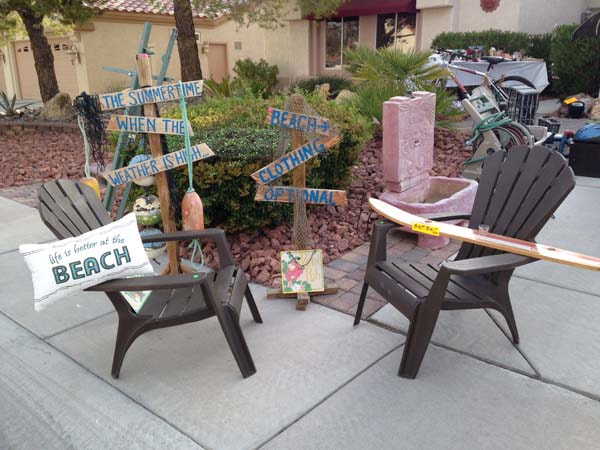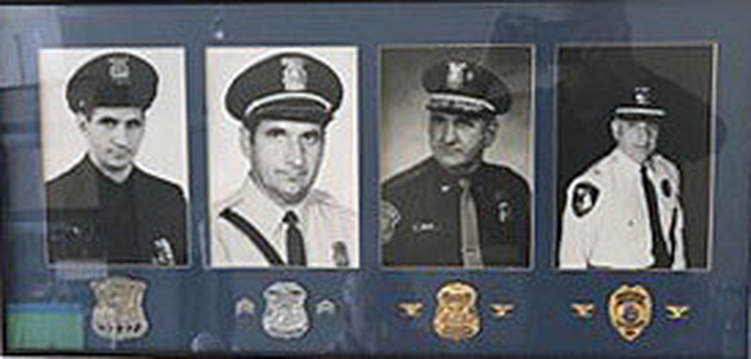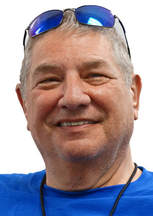SCSCAI Board of Directors Election Count In Progress at Mountain Shadows
The annual meeting of the owners of the Association opened this morning, Wednesday, February 28, at Mountain Shadows to establish a quorum that began the process of counting the ballots in the 2018 Board of Directors’ election. Several BOD Candidates, including Leo Crawford, Mitch Fadem and Barbara Holden, were in attendance. Throughout the day, Election Committee volunteers will record and count ballots that were submitted by SCSCAI homeowners through February 27. At 3 p.m., the meeting will continue with a welcome by current BOD President Joe O’Connell and SCSCAI Executive Director Mitzi Mills. After the approval of the minutes from the 2017 annual meeting have been recorded, comments will be accepted from any BOD committee liaison. That will be followed by the certification and announcement of election results and homeowner comments.
Jeannette Carrillo/Link
Revised CCOC Manual Nears Approval; Club Presidents/Members Invited to Thursday Meeting, 1 p.m.
Sun City club members and CCOC volunteers are asked to review the latest changes to the CCOC Procedures Manual by clicking on the link, http://scscai.com/Governing/CCOC_Proposed_Guidelines_for_Committee_Review_2018-02-14.pdf.
The revision is the latest version of the Procedures Manual that will be presented to CCOC Committee members at the Thursday, March 1, meeting. The meeting will start at 1 p.m. inside the Committee Room at Desert Vista. Club presidents, members and CCOC Committee volunteers are urged to support the changes with the hope of approving this latest version to be forwarded to Sun City’s Board of Directors for final approval at the Tuesday, March 6, BOD meeting at Desert Vista.
If you are a club president or member who has questions about the proposed changes, or you have additional suggestions, please plan to attend the Thursday CCOC meeting.
The revision is the latest version of the Procedures Manual that will be presented to CCOC Committee members at the Thursday, March 1, meeting. The meeting will start at 1 p.m. inside the Committee Room at Desert Vista. Club presidents, members and CCOC Committee volunteers are urged to support the changes with the hope of approving this latest version to be forwarded to Sun City’s Board of Directors for final approval at the Tuesday, March 6, BOD meeting at Desert Vista.
If you are a club president or member who has questions about the proposed changes, or you have additional suggestions, please plan to attend the Thursday CCOC meeting.
Board OKs April Community Garage Sale Dates
Sun City’s Board of Directors approved two weekends in April for the community garage sales during its February 6 meeting. The sales will take place on Friday and Saturday only, April 13-14 and 20-21. As in previous years, garage sales will be permitted from 7 a.m. to 3 p.m. For more information, see Page 21 of the March Link.
THANK YOU FOR YOUR SERVICE -- BILL ZSENYUK, P. II
Service in U.S. Coast Guard Clears a Path to Law Enforcement Career
Four pictures capture police chief Bill Zsenyuk's career.
From left, Manchester, Mylan, Northfield Township and Bellville, all in Michigan.
From left, Manchester, Mylan, Northfield Township and Bellville, all in Michigan.
(Editor’s note: The following story is a continuation of the Thank You for Your Service article chronicling Sun City resident Bill Zsenyuk’s career on Page 12 of the February Link.)
By Bob Cohen/Link
During the many years that Bill Zsenyuk was stationed at Coast Guard Station Belle Isle, Detroit Police Harbor Patrol officers often dropped by, and over time Bill formed friendships with many of them. As the end of his enlistment approached, a career in the Detroit Police Department Harbor Patrol looked enticing. So, when the time came, he joined the Department and switched from one blue uniform to another.
Bill never did get assigned to the Harbor Patrol, but upon graduation from the Police Academy he did get assigned to his old neighborhood, the fourth precinct. Home again!
In the 1961-1962 era, the police did not have radios. There were, however, strategically placed police call boxes. Every 30 minutes, a beat cop was expected to check in to the station house. Miss your check-in time and the sergeant came looking for you. Such was the “Officer needs help” backup plan of the time.
In time, Bill was transferred to plain clothes and assigned to the Clean-up Squad, officers dedicated to policing prostitution, gambling and bars. One morning, during roll call, the lieutenant mentioned that they were receiving complaints of prostitution at a local less-than-prime hotel. Several attempts had been made to make an arrest, but it appeared that the subject was being tipped off to police activity and no arrests were possible. The Clean-up Squad volunteered for the job.
Bill and three other officers visited a local pawn shop, borrowed some musical instruments and presented themselves at the hotel reception desk as a band in town for a local gig. This was quite a common occurrence and aroused no suspicion on the part of the desk clerk. The group went upstairs to the room in question and young Bill was picked to be the john. With the other officers out of sight, Bill knocked on the door and engaged the female occupant in an appropriate conversation. Quickly invited in, Bill turned to close the door. By the time he returned his vision to the bedroom, the suspect was lying nude on the bed displaying her ‘wares.’ A dollar amount was mentioned and Bill pulled out his wallet; but it wasn’t money that he was reaching for, it was his badge. He flipped it onto her bare midriff and said those famous three words: “You’re under arrest.”
At that point, Bill expected her to cover up or cry or plead, but she merely laughed and tossed the badge out the open window, saying “Stop the kidding.” But, of course, he wasn’t kidding and a pair of handcuffs convinced her. The other officers entered the room and congratulated Bill on the arrest. But when he told them that she had thrown his badge out of the window, the congratulations quickly turned to laughs and good-natured ribbing. It didn’t take long before the entire precinct knew the story of the ‘flying badge.’ Later, Bill was transferred to the ‘Big 4.’ Each precinct in Detroit had one Big 4 unit – 3 heavily armed plain clothes officers and a uniformed driver. Their assignment was any violent crime occurring in the fourth precinct, and as the 1960s evolved, there was plenty of work for them. In July 1967, the Detroit race riots occurred. Damage and mayhem was widespread, more than the police could handle. National Guard and regular army troops were brought in to restore the peace, but not before 43 people were dead, 342 injured, and nearly 1,400 buildings had been burned.
Success as an undercover officer led to Bill’s being assigned to the Police Racket Conspiracy Bureau downtown. Now, the whole city was his beat. The focus was on illegal gambling. Bill participated in many raids and worked undercover for extended periods. During one undercover operation, he met local crime boss Saul Shindel and was offered a job working for the mob. Transferred to the organized crime detail, Bill played an active role in a six-month investigation into mob activities in Detroit that culminated in a major, multi-agency raid on Shindel’s operation. As reported in the Detroit Free Press at the time, Bill’s boss, Inspector Robert Bullock, chief of the Police Racket Conspiracy Bureau, said the $10,000-a-day Detroit-area operation was part of a national sports-betting ring based in Las Vegas.
Subsequently, Bill was promoted to sergeant and transferred to Internal Affairs, the section responsible for investigating and prosecuting police misconduct. At the time, the Department was concerned about policemen who ignored the rules, stretched the truth and committed blatant crimes. But the corruption extended into the higher ranks of the Department, as well as city government so pressure was applied to the IA section. Things got so bad that the Department Inspector had his men turn over all their files pertaining to local politicians and problematic executive officers to the FBI.
Bill had his 20 years in at that point and had had enough. He put in his papers and Bill retired.
But retirement didn’t last long. His reputation was established and he was approached by the Village of Manchester, Mich., and offered the position of Chief of Police. Things went pretty well over the next three years, but when the city manager resigned the council wanted Bill to take on that position in addition to being police chief. He loved being chief but equally disliked the city manager role.
So, when he got a call from the city manager of Mylan, Mich., he was open to solving their problem: dirty cops and an ineffective police chief. An offer was extended and accepted; Bill was officially chief of police. His Internal Affairs experience was put to good use and things went on fairly well over the next four years until, once again, Bill was asked to assume the duties of city manager. He and high school sweetheart/wife Aileen decided it was time to go into business for himself.
But you can’t start your own police force. So, Bill did the next best thing: He founded an employment agency specializing in filling police chief positions. And that worked pretty well. He knew the business and had the connections in the profession. During those periods when a good candidate was not available, Bill was occasionally recruited to fill in as a temporary chief. (That happened in Northfield Township and Bellville, both in Michigan.) It worked and business was good.
In 1998, Bill brought Aileen to Las Vegas to see the Detroit mob connected Aladdin Hotel. There was a tense moment when Bill was recognized by one the Detroit mob, but nothing untoward happened, even though at one point Bill “thought we would be sleeping in the desert that night.” Bill and Aileen fell in love with Las Vegas and with the newly opened Sun City Summerlin. That was 1990, and they are still here.
But it may not be quite fair to say that Bill retired here. During the 27 years that he has lived here, Bill has served as the president of the Irish Club, the Softball Club and the Niners Golf Club. In addition, he served five years with the Sun City Security Patrol. And, if that weren’t enough to keep him busy, Bill is writing an autobiography covering his years in law enforcement.
By Bob Cohen/Link
During the many years that Bill Zsenyuk was stationed at Coast Guard Station Belle Isle, Detroit Police Harbor Patrol officers often dropped by, and over time Bill formed friendships with many of them. As the end of his enlistment approached, a career in the Detroit Police Department Harbor Patrol looked enticing. So, when the time came, he joined the Department and switched from one blue uniform to another.
Bill never did get assigned to the Harbor Patrol, but upon graduation from the Police Academy he did get assigned to his old neighborhood, the fourth precinct. Home again!
In the 1961-1962 era, the police did not have radios. There were, however, strategically placed police call boxes. Every 30 minutes, a beat cop was expected to check in to the station house. Miss your check-in time and the sergeant came looking for you. Such was the “Officer needs help” backup plan of the time.
In time, Bill was transferred to plain clothes and assigned to the Clean-up Squad, officers dedicated to policing prostitution, gambling and bars. One morning, during roll call, the lieutenant mentioned that they were receiving complaints of prostitution at a local less-than-prime hotel. Several attempts had been made to make an arrest, but it appeared that the subject was being tipped off to police activity and no arrests were possible. The Clean-up Squad volunteered for the job.
Bill and three other officers visited a local pawn shop, borrowed some musical instruments and presented themselves at the hotel reception desk as a band in town for a local gig. This was quite a common occurrence and aroused no suspicion on the part of the desk clerk. The group went upstairs to the room in question and young Bill was picked to be the john. With the other officers out of sight, Bill knocked on the door and engaged the female occupant in an appropriate conversation. Quickly invited in, Bill turned to close the door. By the time he returned his vision to the bedroom, the suspect was lying nude on the bed displaying her ‘wares.’ A dollar amount was mentioned and Bill pulled out his wallet; but it wasn’t money that he was reaching for, it was his badge. He flipped it onto her bare midriff and said those famous three words: “You’re under arrest.”
At that point, Bill expected her to cover up or cry or plead, but she merely laughed and tossed the badge out the open window, saying “Stop the kidding.” But, of course, he wasn’t kidding and a pair of handcuffs convinced her. The other officers entered the room and congratulated Bill on the arrest. But when he told them that she had thrown his badge out of the window, the congratulations quickly turned to laughs and good-natured ribbing. It didn’t take long before the entire precinct knew the story of the ‘flying badge.’ Later, Bill was transferred to the ‘Big 4.’ Each precinct in Detroit had one Big 4 unit – 3 heavily armed plain clothes officers and a uniformed driver. Their assignment was any violent crime occurring in the fourth precinct, and as the 1960s evolved, there was plenty of work for them. In July 1967, the Detroit race riots occurred. Damage and mayhem was widespread, more than the police could handle. National Guard and regular army troops were brought in to restore the peace, but not before 43 people were dead, 342 injured, and nearly 1,400 buildings had been burned.
Success as an undercover officer led to Bill’s being assigned to the Police Racket Conspiracy Bureau downtown. Now, the whole city was his beat. The focus was on illegal gambling. Bill participated in many raids and worked undercover for extended periods. During one undercover operation, he met local crime boss Saul Shindel and was offered a job working for the mob. Transferred to the organized crime detail, Bill played an active role in a six-month investigation into mob activities in Detroit that culminated in a major, multi-agency raid on Shindel’s operation. As reported in the Detroit Free Press at the time, Bill’s boss, Inspector Robert Bullock, chief of the Police Racket Conspiracy Bureau, said the $10,000-a-day Detroit-area operation was part of a national sports-betting ring based in Las Vegas.
Subsequently, Bill was promoted to sergeant and transferred to Internal Affairs, the section responsible for investigating and prosecuting police misconduct. At the time, the Department was concerned about policemen who ignored the rules, stretched the truth and committed blatant crimes. But the corruption extended into the higher ranks of the Department, as well as city government so pressure was applied to the IA section. Things got so bad that the Department Inspector had his men turn over all their files pertaining to local politicians and problematic executive officers to the FBI.
Bill had his 20 years in at that point and had had enough. He put in his papers and Bill retired.
But retirement didn’t last long. His reputation was established and he was approached by the Village of Manchester, Mich., and offered the position of Chief of Police. Things went pretty well over the next three years, but when the city manager resigned the council wanted Bill to take on that position in addition to being police chief. He loved being chief but equally disliked the city manager role.
So, when he got a call from the city manager of Mylan, Mich., he was open to solving their problem: dirty cops and an ineffective police chief. An offer was extended and accepted; Bill was officially chief of police. His Internal Affairs experience was put to good use and things went on fairly well over the next four years until, once again, Bill was asked to assume the duties of city manager. He and high school sweetheart/wife Aileen decided it was time to go into business for himself.
But you can’t start your own police force. So, Bill did the next best thing: He founded an employment agency specializing in filling police chief positions. And that worked pretty well. He knew the business and had the connections in the profession. During those periods when a good candidate was not available, Bill was occasionally recruited to fill in as a temporary chief. (That happened in Northfield Township and Bellville, both in Michigan.) It worked and business was good.
In 1998, Bill brought Aileen to Las Vegas to see the Detroit mob connected Aladdin Hotel. There was a tense moment when Bill was recognized by one the Detroit mob, but nothing untoward happened, even though at one point Bill “thought we would be sleeping in the desert that night.” Bill and Aileen fell in love with Las Vegas and with the newly opened Sun City Summerlin. That was 1990, and they are still here.
But it may not be quite fair to say that Bill retired here. During the 27 years that he has lived here, Bill has served as the president of the Irish Club, the Softball Club and the Niners Golf Club. In addition, he served five years with the Sun City Security Patrol. And, if that weren’t enough to keep him busy, Bill is writing an autobiography covering his years in law enforcement.







